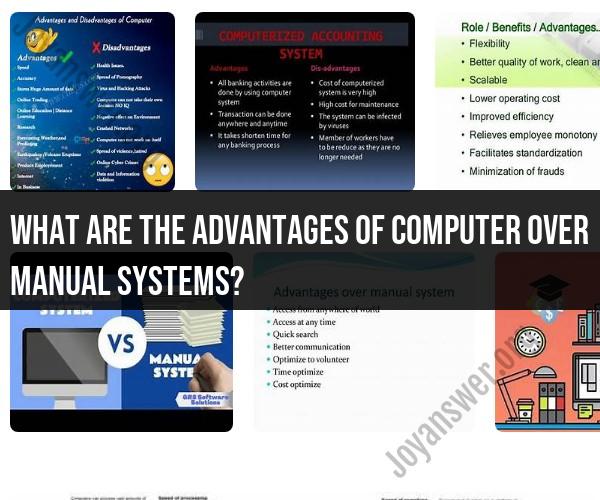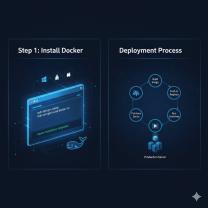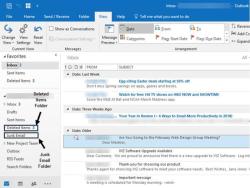What are the advantages of computer over manual systems?
Computer systems offer several advantages over manual methods or traditional paper-based systems. These advantages have contributed to the widespread adoption of computer technology in various industries and processes. Here are some key benefits of computer systems over manual methods:
Efficiency and Speed:Computers can process and perform tasks much faster than humans. They can handle complex calculations, data analysis, and repetitive tasks with incredible speed, reducing the time required to complete many processes.
Accuracy and Precision:Computers are highly accurate when properly programmed. They minimize the risk of human errors in data entry, calculations, and other routine tasks, leading to more reliable and consistent results.
Data Storage and Retrieval:Computer systems can store vast amounts of data efficiently and retrieve it quickly. This makes it easy to access and manage information, eliminating the need for manual filing and record-keeping.
Automation:Automation of repetitive tasks is a significant advantage of computer systems. This reduces the need for manual labor and allows employees to focus on more valuable, creative, or complex tasks.
Cost Savings:While the initial investment in computer systems can be significant, they often result in long-term cost savings. They reduce the need for physical storage space, lower printing and paper costs, and enhance operational efficiency.
Scalability:Computer systems are highly scalable, allowing organizations to expand their operations without significant increases in administrative overhead. Adding new users or expanding data storage capacity is relatively straightforward.
Data Security:Computer systems offer various security measures to protect sensitive data. Access control, encryption, and data backups are more robust and reliable than manual methods of data security.
Remote Access:Computers and the internet enable remote access to data and applications. This is especially valuable for businesses with multiple locations or employees who need to work from various locations.
Data Analysis and Reporting:Computers can quickly analyze large datasets and generate detailed reports. This is beneficial for decision-making, trend analysis, and forecasting in various industries.
Communication:Computers facilitate communication through email, messaging apps, video conferencing, and social media platforms. This enhances collaboration and information sharing.
Search and Information Retrieval:Search engines and databases make it easy to find specific information quickly. This can be particularly useful in research and information-intensive industries.
Environmental Impact:By reducing the need for paper, printing, and physical storage, computer systems can contribute to a smaller environmental footprint.
Error Correction:Many computer applications include error-checking mechanisms that can automatically identify and correct common mistakes.
Consistency and Standardization:Computer systems ensure standardization and consistency in various processes, reducing variability and enhancing quality control.
It's important to note that while computer systems offer numerous advantages, they also come with their own set of challenges, including the need for cybersecurity, training and support for users, and the risk of technology-related issues. Additionally, not all tasks are best suited for automation, and human judgment and creativity remain essential in many areas.
Computer Systems vs. Manual Systems: Advantages of Automation
Computer systems offer a number of advantages over manual systems, including:
- Efficiency gains: Computer systems can automate many tasks that are time-consuming and repetitive, leading to significant efficiency gains.
- Error reduction: Computer systems can help to reduce errors by automating complex calculations and checking for inconsistencies.
- Scalability: Computer systems can easily be scaled up or down to meet the changing needs of a business.
- Data management: Computer systems can store and manage large volumes of data effectively, making it easier to access and analyze data.
Efficiency Gains and Error Reduction in Computerized Systems
Computer systems can automate a wide range of tasks, such as data entry, invoicing, customer service, and inventory management. This can free up employees to focus on more complex and value-added tasks.
Computer systems can also help to reduce errors by automating complex calculations and checking for inconsistencies. For example, a computerized accounting system can automatically check for errors in invoices before they are sent out.
Scalability and Data Management with Computer Systems
Computer systems are highly scalable, meaning that they can be easily scaled up or down to meet the changing needs of a business. This makes them ideal for businesses of all sizes.
Computer systems can also store and manage large volumes of data effectively. This makes it easier to access and analyze data, which can lead to better decision-making.
Human Resource Impact: Jobs and Skills in Automated Environments
Automation can have a significant impact on the human resources of a business. Some jobs may be eliminated altogether, while others may be changed to focus on more complex and value-added tasks.
Employees who are able to adapt to the changing work environment and develop new skills will be in high demand. Skills such as critical thinking, problem-solving, and communication will be essential in automated environments.
Considerations Before Transitioning to Computer-Based Systems
Before transitioning to computer-based systems, it is important to consider the following factors:
- Cost: Computer systems can be expensive to purchase and implement. It is important to carefully consider the costs and benefits before making a decision.
- Training: Employees will need to be trained on how to use the new computer systems. This can be a costly and time-consuming process.
- Data migration: If you are switching from a manual system to a computer system, you will need to migrate your data to the new system. This can be a complex and time-consuming process.
Conclusion
Computer systems offer a number of advantages over manual systems, including efficiency gains, error reduction, scalability, and data management. However, it is important to carefully consider the costs, training, and data migration requirements before transitioning to computer-based systems.













